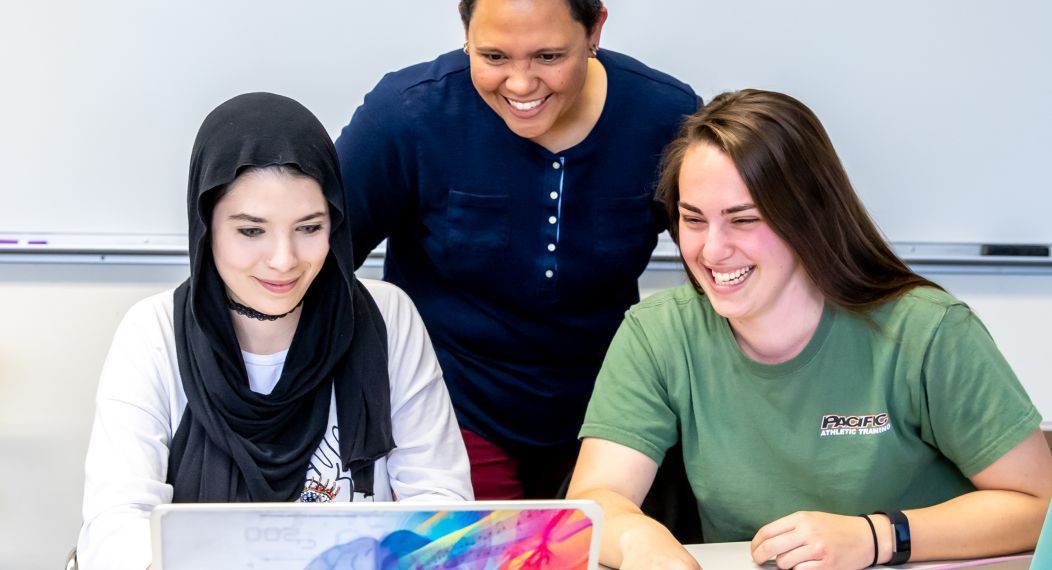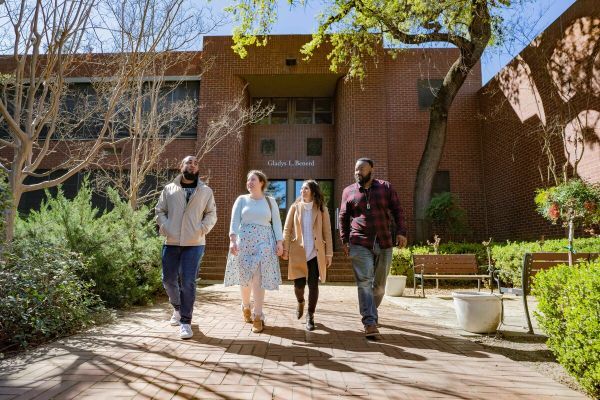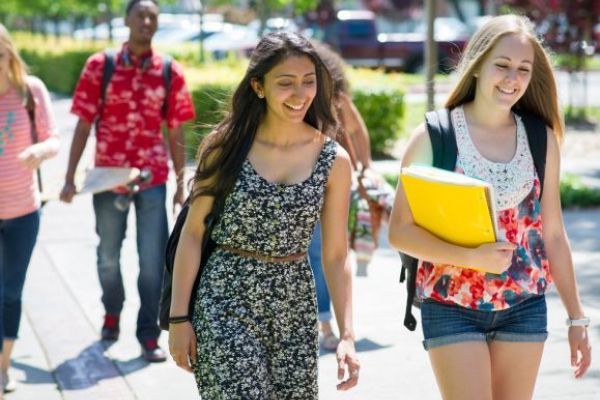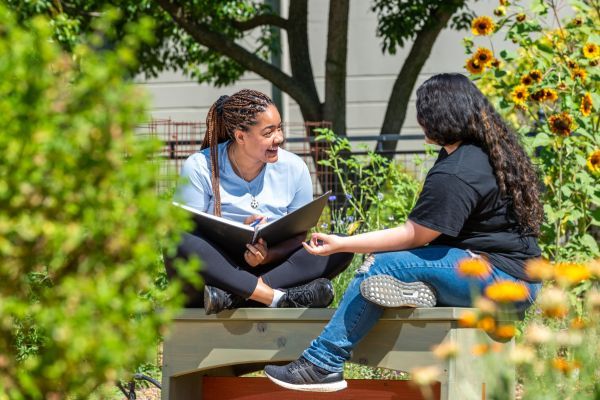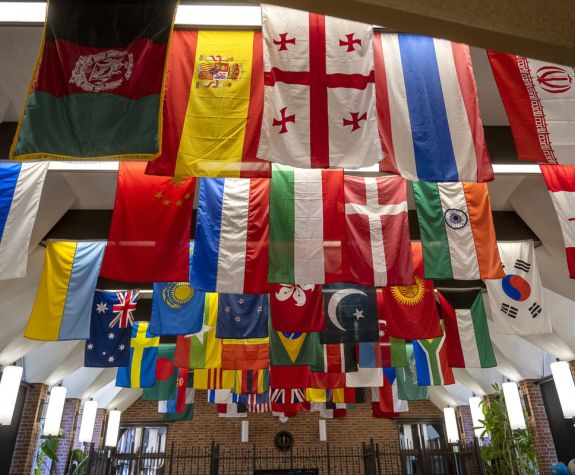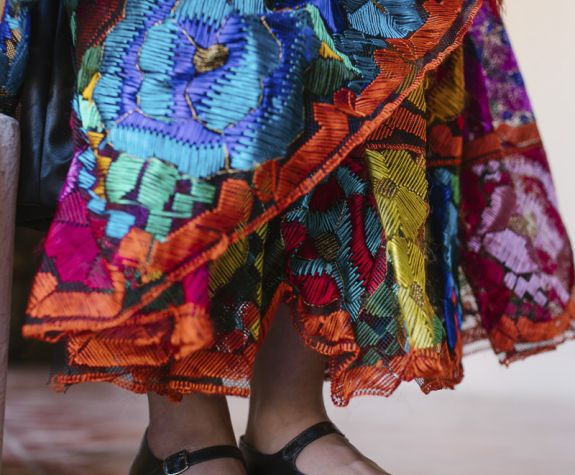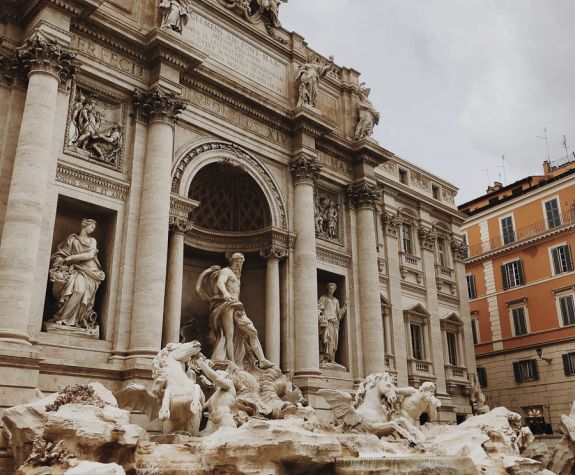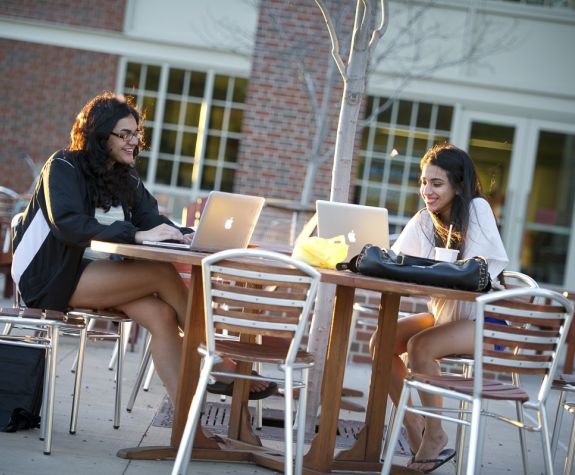Course Name | Units | Course Description |
| PWLC 9057 Descubre Chile | 1 | Come and discover Chile in an online course! This course will take you on a virtual journey through the geography, history, and culture of one of the world’s longest and narrowest countries. By the end of this course you will have engaged with readings, videos, podcasts, and images that offer an abundance of information and ideas to create a lesson or cultural unit for your own classroom. The Descubre courses integrate a variety of resources that you will be able to share with your students and bring Spanish culture alive in your own classroom. Teachers may start a course at any time and complete the work at their own pace within one month. Conducted in Spanish. |
| PWLC 9102 Advanced Spanish Grammar for K-12 Educators | 3 | Using explanatory text and practical exercises, this graduate course provides a comprehensive review of Spanish grammar, targeting problem areas of grammar for many advanced learners. Designed for students preparing for licensure exams, teachers preparing to teach advanced levels, as well as native speakers of Spanish charged with teaching advanced grammar concepts. The course offers a collaborative environment to share tips and best practices on how to teach these difficult concepts. Conducted in Spanish. |
| PWLC 9103 Latin American Rhythm and Beat | 3 | Music can be a great resource for Spanish teachers. Songs have historical meaning that students have to work to uncover and often reflects the time in which it was created, as well as the perspective of its author. In this course we will explore why the artist wrote the lyrics, uncover what those lyrics mean, who the audience for the song was, and what was going on history at the time. We will pair the song with other sources—newspaper articles, radio addresses, videos, biographies, etc. — so you can piece together and better understand a particular historical era. Each week, participants will study the online content, complete activities and share teaching strategies for integrating Spanish songs into their own classes. The course offers a collaborative environment to share tips, unique lessons and best practices for teaching history through music. Conducted in Spanish. |
| PWLC 9106 Spanish Speaking World Through Film | 3 | As teachers of Spanish, one of our major goals is to foster an appreciation of the highly diverse society in which we live. By exposing students to the target language through film we help them learn about challenging issues while developing their linguistic proficiency. This course will address six thought-provoking topics: war, the right to die, immigration, gender roles, identity (nations, nationalities, boundaries), and US foreign policy in the Spanish-speaking world. Background information will be gradually introduced and together we will decode many thematic symbols, cultural, social and political references. Conducted in Spanish. |
| PWLC 9107 Descubre Puerto Rico | 1 | Come and discover Puerto Rico in an online course! This course will provide you with the history, current events, films, readings and relevant information to engage your classroom. By the end of this course you will identify the major people, events and ideas in Puerto Rican history, learn how to identify visual arts in order to obtain information about the culture and have an abundance of resources and ideas to create a lesson or cultural unit for your own classroom. Conducted in Spanish. |
| PWLC 9108 Latin American Art & Architecture | 3 | This course provides an introduction to the art and architecture of Latin America beginning with pre-Columbian times and ending with contemporary creations. Historical circumstances will be taken into account so that the student is able to understand what both art and architecture reveal about Latin American thought and culture. In addition to discovering the cultural and historical background in relation to artistic constructions, students will design a unit lesson plan that appropriately incorporates course material into the L2 Spanish classroom. Conducted in Spanish. |
| PWLC 9113 The Making of Cultural Myths | 3 | This is an online course designed for teachers who wish to continue to develop their language and cultural skills through popular children's films that are available in Spanish. The films selected will be familiar to children and teachers of all ages and available at local libraries or through online streaming. Emphasis will be on vocabulary building, improving conversational and writing skills, comprehension, and film analysis, in addition to discussions of a cultural nature within the context of each film. Group work will be in the form of discussion boards and lesson plan development. Conducted in Spanish. |
| PWLC 9115 Isabel Allende: Personal History and Creative Process | 3 | Best-selling writer Isabel Allende, one of the most widely read Latin American female authors, frames each narrative within a historical context or current event. Her creative process recounts stories in which protagonists explore and endure life’s challenges. Her narrative frequently embraces situations related to social justice and women’s rights, always central to her work and heart. In this course we will explore Allende’s use of magic realism, geographical setting, imagery, word choice, and other stylistic devices in her narrative. Conducted in Spanish. |
| PWLC 9116 Descubre Argentina | 1 | Come and discover Argentina, one of the most beautiful countries in South America. This online course will provide you with learning activities and the experience of immersing yourself in Argentina´s culture of identity and nationalism. Studying Argentina's people, customs, geography, history, and traditions will encourage your students to develop empathy with other cultures and sensitivity about their differences. By the end of this course you will identify the major people, events and ideas in Argentine history, learn how to identify information about the culture and have an abundance of resources and ideas to create a lesson or cultural unit for your own classroom. Conducted din Spanish |
| PWLC 9117 Love in the Time of War: The Time in Between (Entre Costuras) | 3 | El tiempo entre costuras/The Time in Between (a.k.a. Entre Costuras/The Seamstress) is a brilliant novel and television series set in Spain, Morocco, and Portugal during the first half of the turbulent twentieth century. As a point of departure, we will use this remarkable period drama, set against the backdrop of Spain and Northern Africa, as we explore the social underpinnings and political challenges that were precursors to what would become the Spanish Civil War and then WWII. While the plot is fiction, the background is historically accurate and many of the characters whose emotional ups and downs we will share, existed in real life. Conducted in Spanish. |
| PWLC 9124 Masterpieces of Hispanic Poetry | 3 | The study of Hispanic poetry represents a fundamental aspect of the curriculum of any Spanish class. Poetic analysis is among one of the more challenging aspects of literary studies for students and instructors alike. In this course, participants will read and analyze poetry of the Spanish-speaking world across different historical periods, literary movements, and themes. In addition, this course will offer participants strategies and techniques for teaching poetry to students in the Pre-Advanced Placement classroom and in the AP Spanish Language and Culture and AP Spanish Literature and Culture classrooms. Special attention will be given to the literary analysis using poetic devices as a way to explicate different themes in poetry. Course participants will review the curricular underpinnings of the AP course frameworks and gain a solid understanding as to how poetry allows individuals to express their inner being. Conducted in Spanish with some readings in English. |
| PWLC 9128 Descubre Cuba | 1 | As Americans dash to Cuba “before it changes,” it is clear that few understand the island, its history, and its people. Join us as we learn about the historical events that led to the infamous embargo and the everyday realities of Cuba, behind tourist images of beautiful beaches, classic cars, rum, and cigars. By the end of this course you will be able to identify and explain the significance of major people, events, and ideas in Cuban history. Participants will compare and contrast experiences of different groups of people in Cuban society and get a glimpse of the rich arts scene that has been kept alive even during the hardest economic crisis. This Descubre course integrates a variety of resources that you will be able to share with your students and bring the Cuban culture alive in your own classroom. Teachers may start a course at any time and complete the work at their own pace within one month. Conducted in Spanish. |
| PWLC 9129 Masterpieces of Hispanic Short Stories | 3 | The study of the Hispanic short story represents a fundamental aspect of the curriculum of any Spanish class. Reading and interpreting literature (prose) can present a challenge for students at any level. In this course, participants will read and analyze short stories of the Spanish-speaking world across different historical periods, literary movements, and themes. In addition, this course will offer participants strategies and techniques for teaching the short story to students in the Pre-Advanced Placement classroom and in the AP Spanish Language and Culture and AP Spanish Literature and Culture classrooms. Special attention will be given to the literary analysis using literary figures as a way to explicate different themes in the works. Course participants will review the curricular underpinnings of the AP course frameworks and gain a solid understanding as to how the short story allows enables writers to present the social and political issues of their time while developing their creative genius. Conducted in Spanish with some readings in English. |
| PWLC 9138 Spanish Writing Seminar: Using Global Themes to Enhance Written Presentational Communication | 3 | This writing seminar is designed to help Spanish teachers enhance their presentational writing
skills. In an attempt to achieve this goal, participants will examine the various writing genres
that most often appear in the Spanish L2 classroom setting: description, narration, exposition,
argumentation, and academic writing. Using a diverse body of literary and cultural readings as
models, participants will analyze specific writing styles to hone their own writing
skills. Special attention will be given to the AP Spanish Language and Culture Global Themes
as a way to inspire student writing samples. The ACTFL 5 Cs will also inspire participants to
design lesson activities that can be used in their own curricular practice. Conducted in Spanish. |
| PWLC 9142 Masterpieces of Hispanic Theater | 3 | The theater has been a genre in which Spanish writers have excelled, evolving the platform, creating globally recognized characters, and receiving international renown. This course examines masterpieces of the Spanish theater from the Siglo de Oro to the Post-Franco democratic age. Examining works by five of the most important dramatists of Spain’s history, course participants will engage with the social commentary and metaliterary aspects of these works from giants of the Spanish theater. Students will also select a work from the Spanish theater tradition to serve as the focal point of a lesson that they create for their classrooms. Conducted in Spanish. |
| PWLC 9156 Novice-Level Novels to Enhance Communication in the Spanish Classroom | 3 | For communication in L2 to exist, students need something to talk about. Reading short novels crafted especially for the novice learner not only provides characters and a plot, but also the feeling of accomplishment once the novel has been read. In this course, we will discuss the theory of comprehensible input and then go on to use the theory while exploring how to reach novice learners through three novice-level novels in Spanish: Feliz cumpleaños, La chica nueva and El viaje difícil, learning how to incorporate what is already embedded in the novel to further pique students' interest and get the most out of the reading, including culture, geography, food, social issues and even politics. Within each module, participants will examine the online content, read the books, engage in discussion, prepare and share activities for use in the classroom. The course is a forum to collaborate, share ideas and best practices for involving the comprehensible novel in the novice-level classroom. |
| PWLC 9158 Teaching Spanish Grammar as a Concept in Context | 3 | This course is designed to introduce teachers to ACTFL’s Core Practice of teaching grammar as a concept and in context. Participants in this course will start by learning about the research and theories behind implicit and explicit grammar instruction from experts in language acquisition. Participants will also learn more about what it means to choose grammatical concepts in the context of a thematic unit as it pertains to a communicative goal. A special emphasis will be placed on strategies to implement implicit grammar instruction with students through the PACE Model. In this course participants will share ideas for implementing PACE model lessons and also discuss the benefits and challenges of teaching grammar implicitly in classes. (Open to teachers of modern and classical languages of grades k-12. Conducted in English but coursework is completed in Spanish.) |
| PWLC 9170 Let Us In! Incorporating Afro-Latinx/ Black Diaspora Culture and Themes into the Curriculum | 3 | This course focuses on race and representation in the World Language curriculum particularly, the integration of Afro-Latinx identity, culture, and subsequent literature. Through careful exploration of the historical background of African-descended peoples both in Spanish-speaking Americas, Spain (and by proxy, Guinea Ecuatorial) this course will center on identity formation (and the political consequences thereof), literary production, religious traditions and notable contributions. Participants will review research related to the ACTFL standards, analyze cultural products with the goal of curriculum integration. Through a host of interactive activities with classmates, participants in this course will discuss the purpose, rationale, and development of such cultural products and its relevance to the current political landscape. Participants will also explore how topics can play a critical role in establishing an inclusive, representative, anti-racist curriculum, thriving classroom ecology for all students. This course is open to teachers of modern and classical languages (Conducted in English and Spanish). |
| PWLC 9171 Borderlands: Telling Stories of Us vs. Them, or All of U.S. | 3 | Borderlands can be seen as liminal spaces in which the myth of “self” vs. “other” is challenged by the interactions between two worlds which are as defined by their overlap as they are by their distinction. The 2000-mile border between Mexico and the U.S.A. is the only visible border between the so-called “developed” and “developing” worlds. Politically, it is also the perceived boundary between Latin America and Anglo America. Beyond economic and political factors, immigrants who cross this border participate in a broad cultural process of great importance to demographic frameworks and the quality of relationships between countries. The Southern borderlands are the contemporary equivalent of Ellis Island. Currently, Los Angeles, California and Brownsville, Texas, are the second and third largest Spanish-speaking cities in the world (only after Mexico City and larger than Madrid and Barcelona). In this course we will explore some aspects of the Latino/a (Latin@ or Latinx) experience, such as what it means to be Chicano/a, Mexican American, or Puerto Rican living in Manhattan, or a second generation Cuban American living in exile in Miami? How can we better understand these immigrant experiences and their cultural impact? How do these cultures co-exist, rubbing shoulders with one another every day? How has their presence been politicized? These are some questions we will explore. We’ll use literature, film, podcasts, current events, media, and poetry to explore the diversity of cultures in our local communities and classrooms. While focusing on reigniting passion for teaching, we create opportunities for new insights to better relate to and guide students in this very interesting time in our nation’s history where many cultures are coming together (or clashing) rather than one dominant culture subsuming the others. “Cultures only flourish in contact with others; they perish in isolation.” -Carlos Fuentes
|
| PWLC 9182 Exploring the World of Don Quijote: Imagination and Creativity Come Alive! | 3 | Come explore the literary and creative genius of Miguel de Cervantes’ renowned masterpiece El ingenioso hidalgo Don Quijote de la Mancha. Participants in this course will examine Part One (with some chapters most often studied in the middle and secondary classroom) of the work paying special attention to Cervantes’ development of Quijote’s character within the historical and social context of the time. Some of the themes explored - personal identity, literary style, humor, societal values, traditions - will help participants understand why this masterpiece is considered the first modern novel of the time. Close reading analysis and analytical writing will help the course participants enhance literacy skills. As teachers, participants will gain a better understanding of how to approach the instruction of El Quijote in their own classes at different proficiency levels. Supplemental resources will provide course participants with ideas for their own learning and classroom practice. Conducted in Spanish with an occasional reading in English. |
| PWLC 9184 Advanced Spanish Conversation and Culture for Teachers | 3 | This course will explore a variety of cultural aspects of the Spanish-speaking world through thematic units and global themes. The focus of this course is for in-service Spanish teachers to practice their own speaking skills in both the synchronous virtual setting (1 hour per week for 6 weeks) and the asynchronous virtual setting via a variety of instructional technology applications. The course uses a variety of authentic texts - literature, video, music - allowing participants to practice their language skills while developing strategies to enhance conversation at a variety of proficiency levels in their own classrooms. Conducted in Spanish. |
| PWLC 9188 Colombia: un “Encanto” | 3 | This is an online course designed for teachers who wish to continue to develop their cultural and/or language skills through a popular children's film that is available in English and in Spanish. The film selected, Encanto, will be familiar to children and teachers of all ages. Emphasis will be on cross-cultural appreciation and diversity in the arts, the significance of symbolism, reflections and discussions raising cultural awareness, geography, regional differences, science (including technology and innovation), gender differences, cuisine, clothing, vocabulary building, improving conversational and writing skills, comprehension, and film analysis. Central concepts in diversity, equity, and inclusion work, such as “asset based education” (ie one’s gift or super power vs. “deficit based education” or inability to focus/ADHD) will be highlighted throughout. Emphasis will also be on music, such as learning about Colombian culture and Spanish words through songs by artists such as Carlos Vives, Shakira, and Juanes, and famous painters like Fernando Botero. Group work will be in the form of discussion boards and lesson plan development. This course is conducted in English, with a Spanish option for Spanish teachers with submission of writing, readings, discussions, activities, and projects in Spanish. by Dr. Lynn McGovern. |
| PWLC 9190 Teaching Social Justice through Novels in the Spanish Classroom | 3 | For communication in L2 to exist, students need something to talk about, and students of this generation are keen to discuss real topics which can lead to improved critical thinking skills. Reading short novels written expressly for students acquiring L2, provides the perfect springboard to engage in heady topics, such as those surrounding social justice. In this course, students will be presented with social justice issues through reading three novels of different levels in Spanish: Debido a la tormenta, María María: un cuento de un huracán and Como vuela la pelota, and how they can be addressed in the context of the Spanish classroom. Within each module, participants will examine the online content, read the books, engage in discussion, prepare and share activities for use in the classroom. The course is a forum to collaborate, share ideas and best practices for involving level-appropriate novels in the world language classroom. |
| PWLC 9193 Discover Espana (Spain) | 1 | Come and discover Spain in an online course! This course will take you on a virtual journey through the geography, history, and culture of one of Europe’s largest countries. By the end of this course you will have engaged with many different videos, readings, and images that offer an abundance of information and ideas to create a lesson or cultural unit for your own classroom.
The Descubre courses integrate a variety of resources that you will be able to share with your students and bring Spanish culture alive in your own classroom. Teachers may start a course at any time and complete the work at their own pace within one month. Conducted in Spanish. |
| PWLC 9194: Descubre Peru | 1 | Come and discover Peru in an online course! This course will take you on a virtual journey through the geography, history, culture, and cuisine of one of South America’s largest countries. By the end of this course you will have engaged with readings, videos, podcasts, and images that offer an abundance of information and ideas to create a lesson or cultural unit for your own classroom.
The Descubre courses integrate a variety of resources that you will be able to share with your students and bring Spanish culture alive in your own classroom. Teachers may start a course at any time and complete the work at their own pace within one month. Conducted in Spanish. |
| PWLC 9223 Identity, Culture and Writing: Teaching AP with El Despertar de Gaby | 3 | The course centers around El despertar de Gaby, a novel that incorporates themes of identity, family, social challenges, and adolescence, allowing teachers to create rich, communicative tasks across all AP thematic units. Throughout the course, participants will explore how to integrate this novel into their teaching practice to promote paragraph-length discourse, cultural analysis, creative writing, and thoughtful classroom discussions all conducted in Spanish. Teachers will also analyze literary texts and authentic articles that connect with key themes such as self-esteem, the pandemic, social pressure, sexual orientation, and self-discovery, offering an inclusive and relevant approach that reflects the lived experiences of many bilingual and Spanish-speaking students today. |


